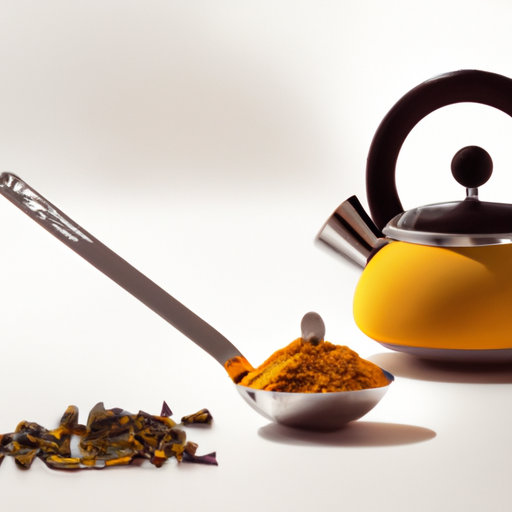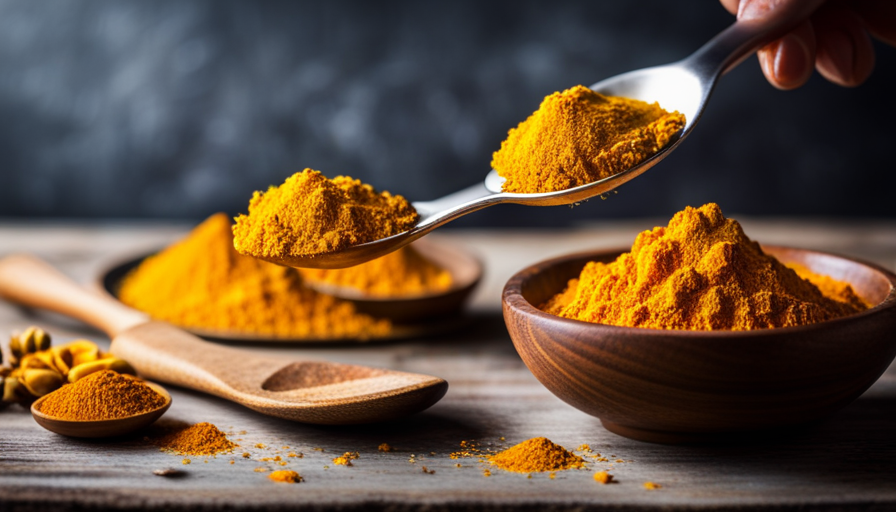Having experienced chronic inflammation myself, I understand the struggles of finding an effective treatment. This is why I decided to explore natural remedies, and one that has been increasingly popular is turmeric.
But how long does it actually take for turmeric to work on inflammation?
Turmeric contains a powerful compound called curcumin, which has been shown to have anti-inflammatory properties. However, it’s important to note that not all turmeric supplements are created equal. The amount of curcumin in turmeric can vary greatly, and it’s the curcumin that provides the anti-inflammatory benefits.
So, while turmeric may be a promising natural remedy for inflammation, it’s important to understand how it works and what to look for when choosing a supplement.
Key Takeaways
- Curcumin in turmeric can help reduce inflammation by inhibiting molecules involved in the process.
- Reduction in inflammation may take days to weeks, so consistent consumption of turmeric is recommended.
- Consuming turmeric with black pepper or a fat source can enhance absorption, while heating it in oil can release more curcumin.
- Turmeric supplements containing 500-2000mg per day of curcumin may also be effective in reducing inflammation.
Understanding the Science Behind Turmeric’s Anti-Inflammatory Properties
Turmeric’s got an impressive reputation for fighting inflammation, but how exactly does it work its magic? Well, the secret lies in a compound called curcumin, which is found in turmeric. Curcumin has been shown to have powerful anti-inflammatory effects, making it a popular natural remedy for a variety of inflammatory conditions. However, the challenge is that turmeric bioavailability is relatively low, meaning that the body has difficulty absorbing and utilizing curcumin.
To increase curcumin absorption, it’s recommended to consume turmeric with black pepper, which contains a compound called piperine that enhances curcumin absorption by up to 2,000%. Additionally, taking turmeric with a source of fat can also improve absorption. Once absorbed, curcumin works by inhibiting various molecules that play a role in inflammation, including cytokines and enzymes.
Overall, while the science behind turmeric’s anti-inflammatory properties is complex, it’s clear that curcumin plays a key role in reducing inflammation.
Now that we understand how turmeric works to fight inflammation, the next question is: how long does it take for turmeric to work on inflammation? Well, the answer depends on a variety of factors, including the dosage, frequency of intake, and the individual’s unique physiology.
In general, it can take anywhere from a few days to several weeks to notice a reduction in inflammation after starting to take turmeric. However, it’s important to note that turmeric should not be used as a substitute for medical treatment, and individuals should consult with their healthcare provider before starting to take turmeric for any health condition.
How Long Does it Take for Turmeric to Work on Inflammation?
You can expect to see a decrease in inflammation after regularly consuming turmeric for a certain period of time. However, the exact length of time it takes for turmeric to work on inflammation depends on various factors, such as the dosage and how well your body absorbs it.
Studies suggest that taking 500-2000 milligrams of turmeric extract daily for at least 8-12 weeks may help reduce inflammation in the body. However, it’s important to note that the anti-inflammatory effects of turmeric may vary from person to person.
Additionally, the absorption of turmeric can be enhanced by consuming it with black pepper or a fat source, such as avocado or olive oil. Overall, it’s best to consult with a healthcare professional before starting a new supplement regimen.
Moving forward, the best ways to consume turmeric for maximum anti-inflammatory benefits will be discussed.
Best Ways to Consume Turmeric for Maximum Anti-Inflammatory Benefits
When it comes to consuming turmeric for maximum anti-inflammatory benefits, there are several options to consider. Personally, I find cooking with turmeric to be the most enjoyable and convenient method.
Turmeric supplements are also a popular choice, but it’s important to choose a high-quality brand and consult with a healthcare professional before taking them.
Finally, turmeric tea is a soothing and easy way to incorporate turmeric into your daily routine.
Cooking with Turmeric
To infuse your dishes with the warm, earthy flavor of turmeric, try adding a pinch to your favorite soups, stews, or rice dishes. Turmeric is a versatile spice that can be used in a variety of recipes, from savory to sweet.
When cooking with turmeric, it’s important to use the right techniques to maximize its anti-inflammatory benefits. One way to do this is to heat the turmeric in oil before adding it to your dish. This helps to release the active ingredient in turmeric called curcumin, which is responsible for its anti-inflammatory properties.
Another technique is to pair turmeric with black pepper. Black pepper contains piperine, which enhances the absorption of curcumin in the body. So, when using turmeric in recipes, it’s a good idea to add a pinch of black pepper to help your body absorb the curcumin more effectively.
By cooking with turmeric and using these techniques, you can enjoy the anti-inflammatory benefits of this powerful spice in your everyday meals.
Incorporating turmeric into your diet through cooking is just one way to experience its anti-inflammatory benefits. Another option is to take turmeric supplements, which can provide a more concentrated dose of curcumin.
Turmeric Supplements
If you’re looking for a convenient way to incorporate the benefits of turmeric into your daily routine, turmeric supplements are a great option. These supplements come in various forms such as capsules, powders, and extracts, and they’re readily available at most health food stores and online retailers.
Turmeric supplements contain curcumin, the active ingredient in turmeric that has anti-inflammatory and antioxidant properties. The recommended dosage for turmeric supplements is generally 500-2000mg per day, but it’s important to follow the manufacturer’s instructions on the label.
However, it’s important to consult with a healthcare professional before taking any supplements, especially if you are pregnant, breastfeeding, or have any medical conditions. Turmeric supplements can be a convenient and effective way to incorporate the benefits of turmeric into your daily routine and help reduce inflammation in the body.
Transitioning into the next subtopic about ‘turmeric tea’, one can also enjoy the benefits of turmeric by drinking it in the form of tea.
Turmeric Tea
Moving on from turmeric supplements, another way to consume turmeric is through turmeric tea. I personally enjoy incorporating turmeric tea into my daily routine. It’s a warm and comforting drink that not only tastes great, but also has potential anti-inflammatory properties.
To make turmeric tea, simply boil water and add in turmeric powder or grated fresh turmeric root. It’s important to note that turmeric is not very soluble in water, so it’s recommended to add black pepper or ginger to enhance its absorption. Here is a table with some brewing tips to make the perfect cup of turmeric tea:
| Brewing Tips |
|---|
| Boil water and add turmeric powder or grated fresh turmeric root |
| Add black pepper or ginger to enhance absorption |
| Steep for 10-15 minutes |
| Add honey or lemon for taste |
| Enjoy hot or cold |
Overall, incorporating turmeric tea into your daily routine can potentially have anti-inflammatory effects and is a delicious way to consume this spice. Moving forward, let’s discuss some other health benefits of turmeric.
Other Health Benefits of Turmeric
Turmeric isn’t just a spice; it’s a powerhouse of health benefits. Aside from its anti-inflammatory properties, it’s also known to benefit skincare and digestion. Its antibacterial and antiseptic properties make it a popular ingredient in skincare products. It helps reduce acne, brighten the skin, and even out skin tone. Turmeric can also aid in digestion by reducing inflammation in the gut and promoting the production of digestive enzymes.
In addition to these benefits, turmeric is believed to have potential anti-cancer properties and may even improve brain function. However, it’s important to note that more research is needed in these areas. As with any supplement or natural remedy, it’s always best to consult with a healthcare professional before incorporating it into your routine.
In the next section, we’ll discuss precautions and potential side effects of turmeric.
Precautions and Potential Side Effects
Before incorporating turmeric into your routine, it’s important to be aware of potential side effects and take necessary precautions. While turmeric is generally considered safe, high doses can cause gastrointestinal issues such as nausea, diarrhea, and indigestion. It may also increase the risk of bleeding, so people who are taking blood thinners or have bleeding disorders should consult with their doctor before taking turmeric supplements.
Additionally, turmeric can interact with certain medications, including blood thinners, diabetes medication, and chemotherapy drugs. It is important to talk to a healthcare provider before taking turmeric if you are on any medication. They can advise on the appropriate dosage and any potential interactions to ensure that turmeric is safe for you to take.
Frequently Asked Questions
Can turmeric be used to treat other health conditions besides inflammation?
Did you know that turmeric can be used to treat other health conditions besides inflammation? It comes in various dosage forms such as capsules and teas, and studies suggest it may aid in digestion, cognitive function, and heart health.
Is turmeric safe for everyone to consume, or are there certain groups of people who should avoid it?
Turmeric is generally safe for most people when consumed in moderate amounts. However, individuals with gallbladder issues, pregnant women, and those taking certain medications should avoid it. Possible side effects include upset stomach and allergic reactions.
How does turmeric compare to other anti-inflammatory supplements or medications?
Comparing effectiveness, turmeric has shown similar anti-inflammatory effects to NSAIDs and other natural remedies. Potential side effects of turmeric are generally mild, whereas prescription medications may have more severe side effects.
Are there any specific dosages or forms of turmeric that are more effective for reducing inflammation?
I have found that higher doses of turmeric, around 1000-2000mg per day, are more effective for reducing inflammation. Additionally, the most effective forms of turmeric are those that contain piperine, such as curcumin supplements or turmeric mixed with black pepper.
Can turmeric be used as a preventative measure for inflammation, or is it only effective for treating existing inflammation?
Using turmeric as a preventative measure for inflammation shows promise, with long term effects being studied. Evidence suggests it may reduce chronic inflammation in the body. More research is needed to confirm its effectiveness.
Conclusion
Personally, I’ve found turmeric to be a valuable addition to my diet for its anti-inflammatory properties. However, the length of time it takes for turmeric to work on inflammation can vary depending on several factors, such as the severity of the inflammation, the amount of turmeric consumed, and the method of consumption.
Research suggests that it can take anywhere from a few days to a few weeks to see the effects of turmeric on inflammation. To maximize the anti-inflammatory benefits of turmeric, it’s recommended to consume it with black pepper and a source of fat, as these can enhance its absorption. Additionally, incorporating turmeric into meals or taking it in supplement form on a daily basis can help maintain its anti-inflammatory effects.
While turmeric has shown to have many health benefits, it’s important to note that it may interact with certain medications and can cause potential side effects such as upset stomach or allergic reactions. As with any dietary supplement, it’s best to consult with a healthcare professional before incorporating turmeric into your diet.
Overall, turmeric can be a valuable tool in managing inflammation, but it should be consumed in moderation and with caution.










